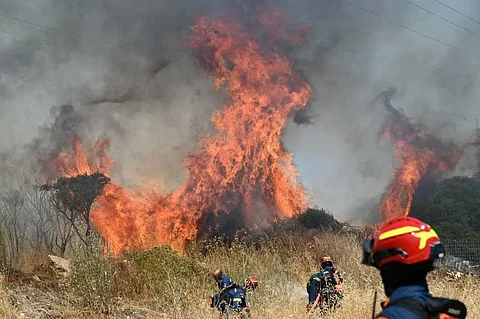
- Destinations
- Experiences
- Stay
- What's new
- Celebrating People
- Responsible Tourism
- CampaignsCampaigns
- SubscribeSubscribe
- Buy NowBuy Now

Greece is once again battling intense wildfires as the country swelters with yet another swarm of prolonged heatwaves. Illimitable blazes have broken out across multiple regions, with firefighters stretched across the islands and mainland in a coordinated effort to contain the flames. The fires come just weeks after similar catastrophes in Turkey and Italy, as the former continues to be embittered, raising concerns across southern France about the rising severity and frequency of climate-induced disasters during peak tourist season.
According to the local officials, areas around Athens have been particularly hard hit by the flames, including the northern neighbourhood of Kryoneri, which has seen "total destruction." Boeotia, portions of the Peloponnese, and wooded regions in central and southern Greece are among the other affected regions. With the help of the military and aircraft sent in to put out the fires from above, emergency services are working around the clock to contain the flames.
Citing a mix of intense heat, dry weather, and strong winds as contributory causes, the Greek government has declared the situation to be serious. Firefighters are having difficulty stopping the fires from encroaching on more populated areas. In the last 24 hours alone, over 50 wildfires have been reported, and as of this week, many are still burning. Although there have been no recorded fatalities, thousands of people have been evacuated and there has been significant property damage.
Prime Minister Kyriakos Mitsotakis has called for international cooperation and composure, saying that "every resource is being mobilised" and that "this is a climate emergency". Under the EU Civil Protection Mechanism, European allies have dispatched expert teams and aircraft as reinforcements.
Authorities have issued severe advisories for both locals and visitors from outside due to the deteriorating wildfire situation. Indian tourists who intend to visit Greece this summer are advised to follow the most recent official directives from Greek Civil Protection and the Indian Embassy in Athens.
A number of coastal and rural locations are either unreachable or under evacuation warnings, even though international flights to major cities like Athens and Crete are still operating. An emergency alert system that provides real-time information to mobile phones in impacted areas has also been introduced by the Greek Ministry for Climate Crisis and Civil Protection.
Thick smoke has caused the air quality in several areas of central Greece to plunge to unsafe levels. It is highly recommended that people with respiratory disorders, as well as those who are travelling with young children or elderly friends, delay their travel to high-risk areas.
In order to avoid affected areas, a number of tour operators in the UK and Europe have already cancelled or redirected programs. Before departing, Indian travellers are encouraged to confirm with their airline or tour operator. Those who are already in Greece should also make sure they have access to emergency helplines and register with their local embassies.
The Indian Embassy in Athens advises extreme care but has not formally issued a no-travel warning. It is also recommended that travellers download the "112 Greece" emergency app and carry their insurance and identity documents close at hand.
Even while well-known locations like Santorini, Mykonos, and portions of Crete are currently unaffected, the wildfire situation is extremely volatile and could quickly alter based on weather patterns. Official announcements encourage travellers to keep informed and reevaluate non-essential travel to central mainland regions. Greece's hospitality sector is currently making every effort to protect visitors, but amid this climate emergency, alertness and flexibility are essential.
(With inputs from various sources.)
